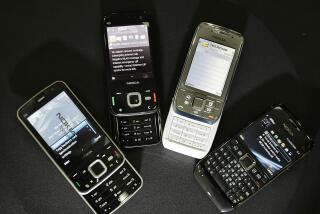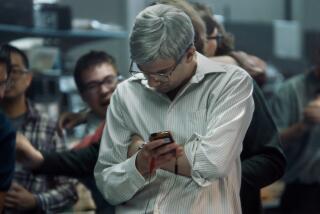BlackBerry outage? Oh, the horror
- Share via
Scott Mitchell Rosenberg will not stay at a certain upscale New York hotel, no matter what you say to persuade him otherwise. He remembers vividly the moment when, traveling on business, he realized that his BlackBerry didn’t get service in the hotel. That’s OK, thought Rosenberg, chairman of Los Angeles-based Platinum Studios -- he unsheathed a second BlackBerry, with a different cellular carrier, which he keeps on his belt for emergencies like this one.
It didn’t work either.
“I walked through the halls holding both of them, looking for [reception] bars,” he remembers. “Neither of them worked anywhere in the hotel.” Rosenberg, who has charted Los Angeles freeways and byways, restaurants and movie theaters in terms of which BlackBerry works best where, buys the devices for all his employees and says that his organization relies heavily on their e-mail and scheduling functions. If somebody doesn’t want a BlackBerry, they’re in the wrong company, he says. “When I first give an employee the BlackBerry, some people find it annoying. But then they get addicted.”
Now Rosenberg and about 4.3 million others are grappling with the possibility of going through “CrackBerry” withdrawal en masse. Research in Motion, which manufactures BlackBerry devices, is being threatened with an injunction stemming from a patent dispute, and on Monday the U.S. Supreme Court refused to intervene. RIM says it has a plan to continue service even if forced to stop using the current technology, but is sketchy on details. And among BlackBerry aficionados and addicts, tension is high.
Elsewhere, BlackBerry foes celebrate. At the technology news website Digg.com, users write: “Shouldn’t this read: ‘CRACK-Berry Shutdown ordered, Millions of Drivers Rejoice??” and “They make people look self-important and busy” and “Die Blackberry! Die!”
There’s a saying: Toss a Tinseltown player, and you’ll hit a BlackBerry. Or there should be. And at the Marriott Hotel in Park City, Utah, headquarters for the Sundance Film Festival, news about the possible BlackBerry outage came as a slap. Producer Anastasia King held her BlackBerry in her lap, waiting for a print of her film -- a look at black disenfranchisement in recent elections -- to arrive for its Sundance premiere. Since buying the device nine months ago, “it has really improved my work flow so that I can be mobile,” she said. The title of her film is an apt metaphor for the BlackBerry crisis: “American Blackout.”
Nearby, Sydney Levine wore her BlackBerry on a dainty silver chain around her neck. She looked stricken at the idea of losing service. “We are a worldwide company,” said Levine, president of Filmfinders, a Sundance festival sponsor. “We get hundreds of e-mails a day. If we had to wait for computers to access our e-mail, I don’t know how I’d get my work done.”
Many BlackBerry users will tell you: This is life or death. In a few cases, they’re not kidding. At MedStar Health, a nonprofit that runs seven hospitals in Baltimore and Washington, about 460 executives and managers use BlackBerrys to keep in touch, says Sameer Bade, assistant vice president. “During some recent communication outages, BlackBerrys were the only way we could communicate with critical service employees,” Bade says, and warns that uninterrupted communication is vital to hospitals in the nation’s capital.
But there was a time before BlackBerrys, wasn’t there? And doctors still healed the sick; movies still came out. These were simpler, more human times, say BlackBerry critics, many of them the spouses or children of vehement BlackBerry enthusiasts. Pamela Rosenberg actually cheered when she saw on the news that RIM was in trouble -- to the chagrin of her husband, Scott Mitchell Rosenberg, he of the dual BlackBerrys.
“We can’t have a nice dinner or go to a movie without him getting e-mails,” says Pamela Rosenberg. “It’s constant, all day and all night, in the middle of a conversation.” Rosenberg rues the day she made her husband promise to get rid of the laptop he once toted everywhere; that was the day he purchased a BlackBerry. “At least with the laptop he couldn’t hide very far. Now I find him hiding out with it in the dressing room closets. I have to take my hand and put it over the BlackBerry if I want to get his attention.”
In his own defense ... well, actually, Scott Rosenberg mounts no defense. Guilty as charged. “We were on a family vacation once,” he says, “and everybody was having dinner. I excused myself to go to the restroom, but I didn’t use the facilities. I just went in there and wrote on my BlackBerry for half an hour. Then I came back to the table and said I had a stomachache. My uncle looked at me and whispered: ‘BlackBerry.’ ”
This “BlackBerry divide” exists between people at the highest levels of government -- and their children. Says Debra Wong Yang, the U.S. attorney for the Central District of California: “My daughter hates my BlackBerry. She thinks it’s too intrusive into our life. But I’m too much of an addict to notice. She has taken it upon herself to hide it from me. I’ve gone on major searches looking for it. It’s funny now, but then it wasn’t so funny.” Most colleagues are too polite to josh her, says Yang, but her 12-year-old just won’t quit. “She’s gotten more vociferous since she’s gotten older, more articulate. Once she asked me, ‘Mom, when you die, do you want me to put the BlackBerry in there with you?’ I said, ‘Only if I can get a signal.’ ”
Ignored children and spouses, however, ought not celebrate yet, even if they do have a U.S. attorney’s daughter on their side. If BlackBerrys go blank, the world will be still for a moment. Traffic will screech to a halt. Songbirds will sing. And then, “I would be in the store immediately, replacing it with some kind of device that would allow me to communicate that way again,” says Scott Pansky, BlackBerry addict and general manager of the L.A. publicity firm Allison & Partners. Sorry, kids.
There is a giddy schadenfreude that pervades the rest of the cellphone industry. “Wireless e-mail was ushered in by BlackBerry,” says Rip Gerber, chief marketing officer at Intellisync, which bills itself as the second-largest provider of wireless e-mail after BlackBerry. “It was a great first act, but the show goes on. The audience has matured and wants much, much more. Thank you BlackBerry, the market will take it from here.” Others who stand to benefit include Palm Inc., whose line of Treo smart phones is a popular alternative to BlackBerry, and new offerings from Nokia and Motorola.
Soap opera intrigue aside, legal experts say RIM simply has too much invested to let service stop; One way or another, they say, BlackBerrys will remain. (Internet gambling site Youwager.com is giving 2-1 odds that BlackBerry will be shut down in the next three months.) But there is something intriguing about the possibility of technology reversing its forward march. We have never held technology in our hands and loved it and hated it and watched it disappear. There should really be some sort of gizmo to help us weather these feelings we’re having. RIM? Anyone? Anyone?!
Times staff writer Robin Abcarian contributed to this report from Park City, Utah. Staff writer Martin Miller also contributed.






